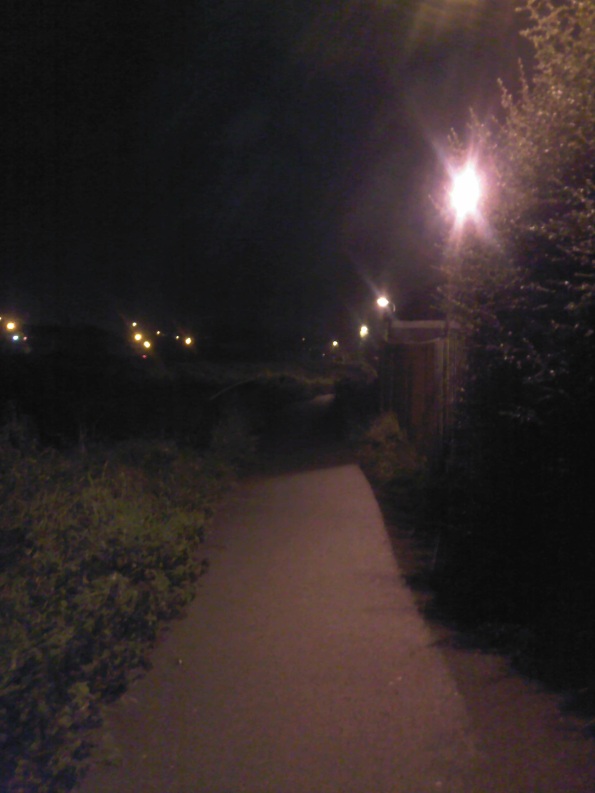Archive
Creative economics, recession and improvisation
I’ve been reading economics blogs. You have to wade through quite a lot of specialist vocabulary (the QE2 is not a ship) and assumptions made by people who do statistical modelling for a living. But they make interesting reading. So part of what I want to write about today is the state of the economy, and part of it is about how that’s going to affect me, and other people (probably much like you) who live pretty ordinary lives and are just trying to make ends meet.
First point: the origins of the recession were a little more complicated than the bankers playing roulette with our money on subprime markets. They were certainly doing that, but the total losses from the subprime crisis, as J Bradford DeLong points out, were about $400 billion. A lot of money, yes: but the US Treasury was prepared to spend $700 billion to shore up or take over failing banks, the burst of the dot com bubble in the 1990s led to around four times this amount of loss from the subprime fiasco, and in terms of world stock markets, $400 billion is an amount that can be lost or recouped in a matter of days as investor confidence moves.
So the problems ran deeper, and DeLong suggests that part of the problem was the lack of confidence in the banking sector that grew when it became apparent that some banks were going to fail and governments wouldn’t bail them out (though they did in fact bail out quite a few as we know); the lack of liquidity as banks themselves curtailed loans; the problems governments then faced in their own financing (financing debts, increased welfare expenditure, decreased tax revenues) and all this against a background in Europe of governments working on the basis of debts amounting to very sizeable proportions of their countries’ gross domestic product. End result: recession, and governments having to introduce austerity measures.
Oh, and now we have the prospect of recovery being compromised by arguments about exchange rates, principally between the dollar and the yuan, which will impact the balance of trade and how cheap or expensive imports and exports will be.
As a side note, other useful blogs on the general economic scene include Susan Estrich at the Washington Examiner and Stephanie Flanders’ Stephanomics blog at the BBC.
Second point: this is going to leave a lot of people paying more for mortgages or rent (fortunately I’m exempt as I only live in my own imagination!) and ultimately paying more for food, travel and other daily necessities because the financial structures that underpin growing food and getting it to supermarkets, for example, will push some people out of business and add extra costs to the others.
It could get bad. I’ve seen it in developing countries, because I’m middle-aged and I’ve travelled a fair bit over quite a few years. Companies and even municipal authorities being unable to meet their salary bills and leaving people unpaid for months. Increasing levels of corruption. Supermarkets being mobbed because for the first time in a week they actually have supplies in. A currency that is effectively denominated in ounces, quarters, teenths and wraps.
I doubt it will get that bad here, though it will feel austere and a lot of people will start doing work on the side. I can remember meeting some academics from a developing country quite a few years back. Their salaries were devalued by inflation (when they were paid, which was intermittent) and they all ran independent businesses. Some kept chickens. Others traded in part-used car tyres. If you wanted your plumbing fixed, you might go to a professor of linguistics who did that at the weekends. And you might pay him in chickens, or sacks of flour. The professor would still turn up to his lectures and write books, because he had some faith that sooner or later things would come right, and it was what he enjoyed doing. But practical skills, barter, and haggling were all part of everyday life. And we may see elements of this creeping into the UK.
Third point, not limited to creatives but that’s where my thoughts lie. Another WordPress blog, Emergent By Design, recently talked about collaborative consumption, or peer-to-peer exchange. The essence of the post was that the internet is a medium for enabling people to match wants and needs (no doubt there are limiting factors, such as dating websites!), allows people to deal directly without intermediaries (buy your pictures direct from an artist rather than a gallery, etc.), enables people to build communities that may be virtual, real, or anywhere in between (for example Facebook pages for arts venues and events that people actually attend) and can ultimately strengthen social capital for participants who help themselves by helping each other, forging relationship networks that can refer work back and forth through personal recommendation etc.
For creatives particularly, and especially those who’ve been used to working in areas where there has been arts funding and won’t be in the future, it will be an interesting time. The thing is, the economy is ultimately a means for enabling people to live. If it stops being that, they’ll just improvise. I’m not sure, frankly, how things such as writing stories, or making music, films, or paintings will translate into practical and barterable/tradable skills. But one of the things about being creative is that inventiveness and improvisation comes as part of the territory.
Wish us all good luck for the next few years.
National Freelancers’ Day
I won’t be settling down to work properly until a bit later in the day, because I have a couple of jobs I need to get out of the way first like deliver some of Chris Cafferkey’s photos to an exhibition. Call it a celebration of National Freelancers’ Day in that I’ve scheduled my working day the way I need it to be!
Time for some old news
Time for some old news.
Nostalgia in the new big thing.
Wikipedia defines it as a yearning for the past, often in idealized form. Feeling nostalgic implies a longing for the ‘good old days’, a period when life was simpler, easier, happier and more prosperous.
What period that might be, exactly, is something that probably varies depending on one’s age and life history. Maybe, for most people, nostalgia harks back to a period when we didn’t have feelings of nostalgia because we hadn’t suffered many of life’s downturns.
Feelings of nostalgia often come when times are hard, and because a lot of people are experiencing hard times right now, there seems to be a lot of nostalgia about.
I’ve been poking about in retail industry publications and it seems nostalgia is big business right now. In fact, by mid-2008 many of those publications were screaming that in order to survive the recession, companies should anticipate and ride the wave of nostalgia they saw coming.
Many of them have done precisely that. A lot of 1970s foods, from steak and kidney pies to baked beans, have come back into fashion, a lot of companies have returned to or recreated the look of labels and advertising from the seventies and earlier. The new (old) look is intended to imply that these are long-term, trusted brands that offer some emotional security. Apparently the best-selling toy game of 2009 wasn’t a Wii or Xbox or computer game, but Scrabble.
The same thing’s been happening with advertising, of course, with the return of the Milky Bar Kid among many others.
In music, I’ve noted increased interest in folk music. Presumably the folk musicians have been there all along, playing in small pubs and clubs, but now they have a larger stage and more media exposure. Not that folk was a 1970s thing, particularly, but it meshes with the retro ethos going around.
On TV, there’s been a sudden increase in programmes about the past, from attempts to recreate period shops to revitalise a high street, to ‘thrift’ programmes about how to get a period look in your house by buying second-hand or developing craft skills.
Also on TV, and maybe a little more difficult to understand, I’ve been noticing a lot of old science fiction and horror making a return. Is that just a function of where my own attention has been going? Is it reminding us that thirty years ago, we expected the future to be better than it is? Or that thirty years ago, the dystopian views of broken societies we had then are finally coming to pass? I’ll have to ponder that one.
Conclusions? Well, none very startling. To repurpose that famous quote by Baudrillard, when society is looking broken, what we can do is play with the pieces – in this case, pieces from our past that we want to recreate and cast somehow, like runes or dice, into new patterns that will offer new solutions.
A couple of the resources I used – Talking Retail and Reuters.
Wuzgonna
In my house, there’s a word that’s probably used by other people as well but seems much less common than I’d thought. It’s got an entry in the Urban Dictionary, sure, but the page just says ‘that term isn’t defined yet’.
The word is ‘wuzgonna’, as in: ‘I wuzgonna go to Novacon this weekend’ (does that make it a conditional verb? I seem to be forgetting my grammar!) and also as in ‘Novacon turned out to be a wuzgonna’ (i.e. a noun for an activity that was going to happen but, from the speaker’s point of view, didn’t).
Also, the Day of the Undead turned out to be a wuzgonna.
OK, Novcon ran for the whole weekend and the Day of the Undead was a one-day event yesterday, but with a bit of planning I could have done both.
What I did instead was act like a socially responsible adult and: (1) not take a friend’s son to the dentist – he’s 21, has a dentist phobia, I said I’d take him but an hour before the appointment he refused to go and phoned the dentist to cancel (2) wrote two exams for a distance learning provider, with a deadline of tomorrow. So at least I got something done before a deadline, which isn’t exactly a first but is handy because much of next week is already blocked off for various other projects and appointments.
There are some notable wuzgonnas in the past, notably booking myself onto an Arvon Foundation writing course, because the one I really wanted to do about three years ago was oversubscribed and that particular course with those particular tutors has never been repeated and I haven’t ever seen anything similar since.
Oh well. I think it’s just a case of doing the things I can do. I’ll have a bit of time later on today to actually write a bit of fiction, which is something that’s turned out to be problematic recently (a few days ago I found the time to add 8 whole words to a story I have in progress…). As Karen Ranney pointed out recently, writer’s block can sometimes happen, but writer’s life is a far more common affliction.
Anyone want to share their own wuzgonnas? And if anyone did get to Novacon or Day of the Undead, how were they? I’ll have to enjoy them both vicariously now!
Needs of the Dead
A new short story – well, not new exactly since I wrote it a while back – is now out in Theaker’s Quarterly Fiction 34. Zombie stuff. I’ll have to read the rest of the issue now to find out what other authors have been up to!
In the kitchen, at a party
There are no great theoretical insights here, it’s really just an observation on modern times.
I was in the kitchen at a party (because I’m always in the kitchen at parties). Of six of us talking in a group: four currently on antidepressants, one recently stopped taking them and me, who’s managed to avoid them. That’s not to say I haven’t had my depressive moments in the past, just that by luck more than judgement I’ve seen counsellors and therapists instead.
And it’s not the first time: it’s the third or fourth time in the last year or so, at different parties with different people.
Some quick internet searching this morning told me that the numbers of people on antidepressants has been increasing rapidly in the last decade, and recent research suggests that in 2006 around 4% of males and 9% of females in the UK were likely to be on antidepressants – the proportions in different population subgroups varies, and increases with age. They were, moreover, on them often for periods of 4-5 years.
My party experience isn’t exactly statistically accurate, but on the other hand I don’t think the parties I go to are especially for depressives either. The current figures for antidepressant use are undoubtedly higher than the 2006 figures suggest, since the numbers of prescriptions issued has been rising quickly. And there’s no simple association between the prevalence of mental health problems such as depression and the prescription of antidepressants, which has far outstripped the rise in diagnoses of ‘common mental health problems’ and in any event it seems only around one-third of those with such problems are prescribed antidepressants (though they may of course be given other treatments or medications).
I don’t think it’s possible to conclude life is harsher now than it has been in the past. Think back to the 1960s and the extent to which doctors prescribed ‘mother’s little helpers’, as they were then known. Think back to the period of the World Wars, and the depression between them; life was astonishingly tough, not to say brutal and horrific, for huge numbers of people. But for many people now, life is tougher than it has ever been during their own adult lifetimes.
And it does strike me, forcefully, that if we have a society in which such a large proportion of the population need some kind of medication to come to terms with and live through their social reality, it’s the social reality that really needs fixing, not the people.
That’s my thought for the day. Precisely what needs fixing, and how it can get fixed, is a whole other post. It does usually take me a couple of days to work out solutions to life, the universe and everything, but I’ll put it on my to-do list…
Useful quick references about antidepressant use, incidentally, are:
Coleman, I., Wadsworth, M., Croudace, T. and Jones, P. (2006) ‘Three decades of antidepressant, anxiolytic and hypnotic use in a national population birth cohort‘, British Journal of Psychiatry 189: 156-160.
Gutierrez, D. (2009) ‘Number of Prescriptions Written in UK for Antidepressants Nearly Equals Entire Population‘, Natural News, Friday, December 04.






Fabrika, Leicester – Critical Mass
Fabrika recently announced ‘Critical Mass’, an open submission exhibition and earlier in the week I dropped off four of Chris Cafferkey’s photos there. Earlier today we were in Leicester together and nipped in for a coffee, to discover they (and quite a few others, obviously) were in the process of being hung. Her pics are of course brilliant, though my pics of her pics, taken on my mobile phone, are rather lower quality…
Pics waiting to be hung
Someone else’s pic is at the back of the stack, behind the square ‘owl’ photo – no idea whose it is but it looked interesting.
Three flower pics
Owl pic, still wrapped
Fabrika, exterior
The pics should be up later today (Friday) and the exhibition runs, I think, until the end of next week.
Share this: